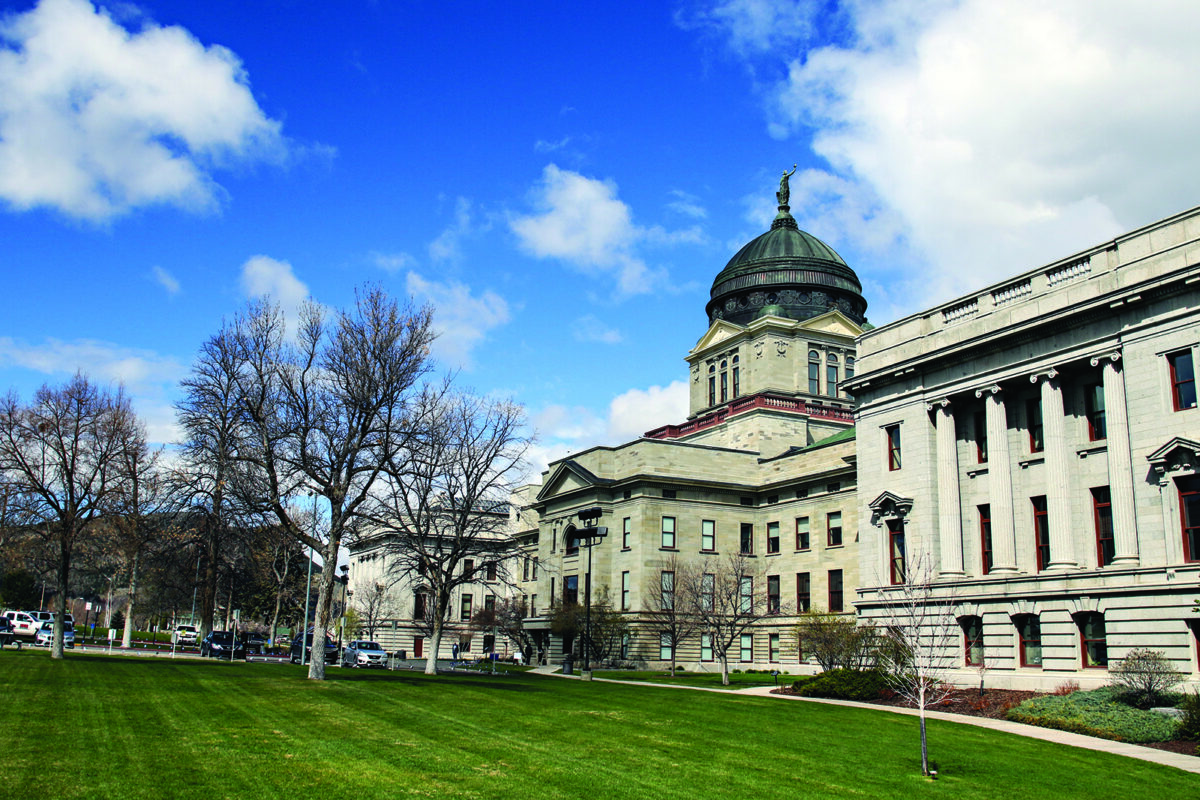As the delegates of the Montana Constitutional Convention filled the well of the Montana House of Representatives on Monday, Nov. 29, 1971, joining State Supreme Court justices, elected officials and the leadership of the 1971 House and Senate, the University of Montana Concert Band played a medley of American overtures.
A temporary secretary, sergeant at arms and journal clerk were appointed, an invocation by the Reverend Lionel B. Simonson was given, and the Pledge of Allegiance was recited.
Then, Montana Gov. Forrest Anderson turned to address the assembled delegates:
“The Constitutional Convention will reestablish the foundation of law for the government in this State. I believe that this is a profound expression of our fundamental belief in self-government,” Anderson said. “Many generations of Montanans not yet born will live under these laws if you do your job well. Constant change and the emergence of new ideas and beliefs will challenge the wisdom of your efforts. And each of you will leave a mark forever on the history of Montana.”
After the governor closed his remarks, the Chief Justice of the Montana Supreme Court administered the oath of office to 100 delegates from across the state, and the months-long process of crafting the 1972 Montana Constitution — the Constitution that remains the governing document of the state — began.

Fifty-one years after the delegates of the 1972 convention gathered for the first time, the 68th Montana Legislature is considering a number of proposed constitutional amendments, ranging from efforts to codify concealed carry to allowing the governor to appoint the Supreme Court in place of popular elections. Lawmakers filed 67 constitutional amendment bill drafts in 2023, 19 of which were officially introduced in the Legislature and seven of which are still making their way through the body’s two chambers, though with slim odds of passing. All 67 of the amendment drafts were brought by Republicans.
Constitutional amendment proposals this session have far outnumbered those introduced in past Legislatures, a data point that has drawn ire from Democrats and moderate Republicans, who see the push to revise the state’s Constitution as an unwarranted attempt by the Republican party to consolidate power — a party that is now governing with a bicameral supermajority for the first time since 1972. Since Montana voters ratified the Constitution 50 years ago, a total of 34 amendments have been passed, at the pace of less than one per year, far fewer than the number being considered in this session alone.
Yet efforts by the GOP to change the Constitution have met roadblocks in recent weeks, as constitutional amendment bills have failed to garner critical Republican votes, dying in committee or on the House and Senate floor. Despite the fact that various amendments would bolster the power of the GOP, many Republican lawmakers have proved unwilling to support them, a reflection of a heterogeneous majority party and a state that remains hesitant to tamper with its foundational document. As lawmakers in Helena decide the fate of the remaining amendments, resistance even among Republicans raises questions over the goals of the party and the pulse of the state’s electorate.

“I think anyone can see that difference between this session and previous sessions of any kind, just in terms of the number, not only that are actually now making their way through the process, but also the number that were just pulled for drafting,” Rep. Laurie Bishop, D-Livingston, said, speaking about the record quantity of amendment proposals moving through the Legislature.
Bishop is the vice chair of the House Judiciary Committee, a body that has heard testimony on many constitutional amendments this session. Of the 19 amendments introduced this session, House Judiciary tabled four — three that would have amended the state’s redistricting process, and one that would have allowed for citizens grand juries to require county attorneys to prosecute crimes.
Unlike the regular bill process, constitutional amendments must pass the Legislature with a two-thirds majority, or 100 legislators between the House and the Senate. If passed by 100 lawmakers, constitutional amendments are then placed on the ballot at the next general election, where they are either approved or denied by the voters. Legislators cannot pass constitutional amendments without the consent of the Montana electorate.
While Republicans possess supermajority control of the Legislature — there are 68 Republicans in the House of Representatives and 34 in the Senate — the passage of constitutional amendments requires united support from the party, a difficult standard to achieve. Given nearly unanimous opposition to constitutional amendments so far by Democrats, the GOP would need all but two Republican lawmakers to vote for the amendments that are currently on the table, assuming no Democrats defect and join them, a feat that has proven unattainable in recent floor votes.
“It’s a high bar to get 100 legislators on board, and its a high bar to get 51% of Montanans to agree,” Speaker of the Montana House Rep. Matt Regier, R-Kalispell, told the Beacon.

A number of the bills that have been considered on the House and Senate floors this session would strengthen the power of the Legislature and the governor’s office, and would diminish the autonomy and independence of various state bodies, including the Montana Supreme Court, the Board of Regents and the Districting and Apportionment Commission.
House Bill 915, introduced by Rep. Bill Mercer, R-Billings, would do away with elections for the Montana Supreme Court, instead allowing the governor to appoint justices. House Bill 517, introduced by Rep. Mike Hopkins, R-Missoula, would compel the Board of Regents to comply with laws imposed by the Legislature. A number of other bills, including Senate Bill 534, brought by Sen. Tom McGillvray, R-Billings, would change the process of drawing legislative and congressional districts.
For Democratic lawmakers, the push by Republicans to amend the Constitution is a direct result of the party’s dissatisfaction with the state’s courts, which have blocked various Republican-backed laws in recent years.
The Montana Supreme Court this past June struck down a law allowing individuals to carry open or concealed firearms on college campuses, ruling that state legislators had infringed upon the constitutional autonomy of the Montana Board of Regents.
In August, the Supreme Court upheld a lower court ruling that blocked three abortion laws passed by the Republican-controlled Legislature in 2021 — laws that would have banned abortions beyond 20 weeks, eliminated tele-health services for medication abortions, and mandated that abortion providers offer patients the option to listen to the fetal heartbeat or view an ultrasound 24 hours before obtaining an abortion.
In September, Yellowstone County District Court Judge Michael Moses blocked a Republican-backed law that barred Montanans from changing the sex listed on their birth certificate.
That same month, Gallatin County District Court Judge Rienne McElyea struck down a state law banning transgender athletes from participating on collegiate women’s sports teams, ruling that the law, too, violated the constitutional authority of the Board of Regents.
“It makes sense that a lot of these constitutional amendments tend to be somewhat reactionary,” Lee Banville, political analyst and director of the University of Montana School of Journalism, said, highlighting a direct connection between previously blocked Republican legislation and current amendment proposals.
“I think a lot of these amendments are about addressing structural things that they can’t fix by just passing a bill,” Banville added. “What will happen is it will get challenged in court, and it seems pretty clear they might lose. So therefore, change the document they’re interpreting to shoot down my law, and I can not only pass that law, but I can pass other laws related to it.”
A number of Republican-backed bills this session have also raised questions over constitutionality, and will likely face contentious battles in state courts as opponents attempt to block them from going into effect.
Montanans have pushed back on the constitutionality of Senate Bill 99, a bill introduced by Sen. John Fuller, R-Kalispell, that would ban gender-affirming care for transgender minors; Senate Bill 458 by Sen. Carl Glimm, R-Kila, that would define sex in Montana law; and House Bill 721, introduced by Speaker Regier, that would ban dilatation and evacuation abortions, among other bills.
For Bishop, amending the Constitution to limit the power of the courts would create a political climate where constitutionally questionable bills could be passed without impediment.
“Because we keep being told that these things are unconstitutional, either we don’t want to believe it, or it’s really inconvenient,” Bishop said, speaking about the Montana Republican Party. “If we give ourselves the power to appoint the people that we think would be more in thinking with us, maybe we can find ourselves in a political future that allows us to pass any legislation that we deem fit.”
“We could achieve all of our goals without having to have a concern of a judiciary that would be in the way,” the representative continued. “One-hundred percent. That is what’s ultimately behind that.”
Yet, Regier characterized the 67 amendment drafts as “good government,” highlighting changes to the United States Constitution that have been ratified as the political climate has transformed.
“Look at the federal level, look at how many constitutional amendments we have there,” Regier said. “For the left to say, ‘that’s a perfect document’ … [that] seems really weird and anti-democracy.”
When asked about specific amendments that would change judiciary processes in Montana, Regier pointed to what he described as the runaway power of liberal judges who wield their position to accomplish political goals.
“There’s a lot of good judges here in Montana, but there’s also a handful of activist judges that want to be legislators,” Regier said. “We have seen them take laws and squeeze them into some sort of unconstitutional gymnastics.”
“The left tries to use the word unconstitutional to try to get rid of anything they don’t like,” the speaker said.

In February, several hundred people gathered in the state Capitol to rally against changes to the state Constitution. Speakers included longtime Montana legislator Dorothy Bradley and former Gov. Marc Racicot, who was rebuked by the Republican party earlier this year for speaking out against recent strides taken by the GOP.
“If we fail to come together, we will squander our Constitutional heritage and our environmental heritage,” Bradley said at the rally. “It is so disheartening to see the stream of harmful proposals coming out of this Capitol every week. But look around yourselves, at this beautiful hall. This is our place too. We belong here too.”
For Rep. Bishop and the minority party, who have voted against nearly every single amendment, public opposition to constitutional changes should inform the strides of policymakers.
“We feel that the voters have been really clear that there isn’t a strong interest in changing the Constitution and that there are inherent risks in every direction,” Bishop said, speaking about Democrats’ resistance to passing constitutional amendments. “We feel like that is wasting our legislative time, even to put it on the ballot to solve a problem that Montanans haven’t told us they have.”
“There seems to be a comfort level with the level of checks and balances in the system as it exists now,” Banville said. “There isn’t this overwhelming sense that the system is broken and that we need to change the system in Montana.”
Banville referenced a 2006 constitutional amendment proposal that would have changed the name of the “Office of the State Auditor” to the “Office of the State Insurance Commissioner” to better reflect the purpose of the office, an amendment that he said “went down in flaming defeat.” The proposal was defeated by more than 100,000 votes.
“There’s a sort of, ‘Things that are okay the way they are, and you’ve got to convince me we need to change it’” in Montana, Banville said.

Despite the record number of amendments Republican legislators introduced this session, nearly every single one has failed to garner enough Republican votes to land on the ballot next election cycle.
House Bill 551, which would allow for concealed firearm carry, lost three Republican votes in the House on Monday, requiring the support of one Democrat in order to pass in the Senate, an extremely unlikely prospect. House Bill 915, which would do away with Supreme Court elections, lost four Republican House votes. House Bill 517, which would impact the autonomy of the Board of Regents, lost seven Republican votes.
Bills that would implement a “right to hunt” in the Constitution and change redistricting in the state also fell short of Republican votes, rendering them effectively dead as of early this week. An amendment to secure the office of county sheriff failed on second and third reading in the Senate.
Senate Bill 563, which would establish a mental health trust fund in the state of Montana and has seen bipartisan support, is the only amendment proposal that remains truly viable.
For Banville, the failure of these amendments despite a Republican supermajority raises questions over the strategy of the GOP going forward.
“What this does is it just highlights the fact that not all Republicans think the same. Oftentimes, Republicans, or any party in power, doesn’t want that to be the message. It really highlights the fact that there are divisions within the party.”
“Do you keep trying to change things structurally because it’s so important to change them structurally? Or do you stop because you can still get a lot done and it feels less fractured than if you’re spending time fighting each other on some of these amendments? That will be the big question,” Banville added.
As Gov. Forrest Anderson concluded his remarks, he addressed the 1972 delegates of the Constitutional Convention once again.
“There are those who consider this Constitutional Convention to be an extension of the legislative process. And they would make it the responsibility of this Assembly to decide issue; of present importance — now and forever. I believe, if this is allowed to happen, the intent of the Constitution will be compromised and its hope of success will be destroyed,” Anderson said. “You are here to write a constitution — not a body of statutes. And this document must withstand the seasons of history — not just the climate of current opinion.”
